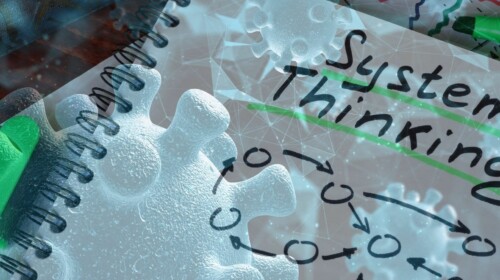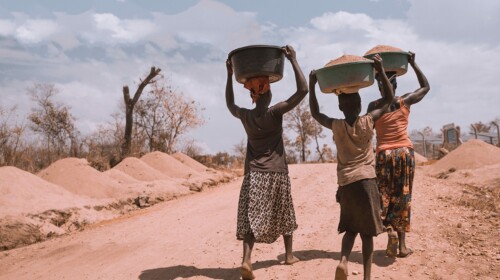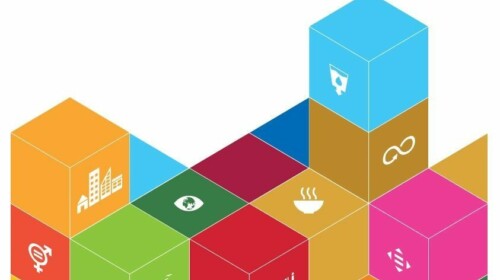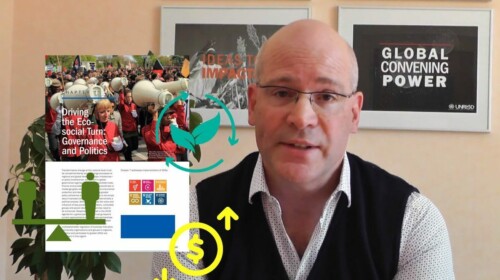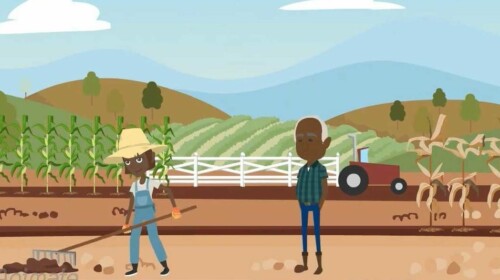COVID-19, for better or for worse, has accelerated every transition we can think of. It has created pressure to connect people by providing remote access to health and education. It has highlighted the importance of public services, and restated the critical role that governments can play to shape development. It has stimulated businesses to implement strategies that increase resilience, by embracing remote working. These needs have emerged because COVID-19 has made clear that our supply chains are weak; our governments are slow in responding to a crisis, waiting at first to then overreact at a later stage; before embracing the crisis, individualism dominates public opinion as much as nationalism dominates public policy.
On the other hand, there are many positive outcomes that COVID-19 has brought to the table of just about every citizen of the World. First, change is possible. Second, we know what to do. Third, the time to act is now. Let me explain why I see these three developments as the opportunities of a lifetime.
I have studied Systems Thinking and System Dynamics at the beginning of the century. I have worked with these methods on a daily basis, for way more hours than I care to admit, for the past 20 years. These last two decades have been a rollercoaster for me. Working on sustainable development, I have lived moments of great excitement and motivation as well as periods of discomfort and resignation. I can remember as if it were yesterday that, when standing on a white sandy beach in Mauritius in a cloudless evening, after a long day at work, I felt like I could swim to Antarctica and back. That day I met the Prime Minister of Mauritius and had the opportunity to talk to him about the use of integrated models, based on systems thinking, to inform policymaking and the concept of Maurice Ile Durable (Mauritius Sustainable Island) that he had just launched. I had endless energy and motivation that evening. At the same time, I remember very well being on a train in December 2009, on the way back from COP15 in Copenhagen, being exhausted. It was not physical exhaustion, it was mental, emotional. COP15 was not the first large, international gathering I attended, but somehow I had high expectations for its outcomes. It turned out instead to be a colossal missed opportunity in my eyes.
Treasuring successes, learning from frustration, and having spent most of my professional life working with systems approaches I am deeply convinced that the road ahead is extremely clear. We need to connect the dots, develop policies and implement investments that simultaneously generate benefits across economic sectors, for all economic actors, for all dimensions of development (or SDGs), as well as over time. It is not that difficult to plan, it is a whole different challenge to put it into practice.
So where does COVID-19 come into play? In my eyes, COVID-19 is an enabler for the changes that will come in the next 20-30 years. Without such a global socio-economic crisis, coupled with the ongoing environmental crisis, we would not have the courage to act and take our planetary future in our hands.
First, COVID-19 has made it clear that change is possible. The international community spent decades debating whether and how to address sustainability concerns, discussing how expensive it would be to reduce emissions to limit global warming. In a single year, the amount of resources mobilized to support the economy in the aftermath of the global pandemic made investments in climate mitigation and adaptation seem small, and even undersized.
Second, we know what to do. Systems approaches have been available for several decades. Specifically, Systems Thinking and System Dynamics were created in the late 1950s and have been applied to sustainable development since. Issues related to sustainable development have been known for a similar amount of time, if not longer. For instance, modern forms of renewable energy for power generation saw initial developments in the 1980s, as a result of the oil crisis. Denmark pioneered investments in wind power generation at that time, to become a world leader for technology development two decades after. Methods are known, we are familiar with the issues, and we also know what solutions are most effective. The solutions we need now are not that different from those identified in the context of Green Economy planning, the main strategy discussed at the Rio+20 conference. As a result, we know well that sustainable investments generate benefits across social, economic and environmental indicators.
Third, the time to act is now. COVID-19 has taught us that decisive action is needed if we want to have an immediate and lasting impact. Waiting, when we are headed towards a crisis, does not help. Resistance to change, in a deteriorating context, can only make the situation worse. What COVID-19 has also made explicit, is that for the first time we are all citizens of the World, living on the same planet. This is true for the public and private sector, as well as for households. We have all been impacted by COVID-19, because of our actions and the actions of others, indistinctly. Still, we have all acted to improve the situation, moved by the same goal.
These three outcomes of the COVID-19 pandemic show me that (i) hope it’s not lost for sustainable development, on the contrary (ii) we know that change is possible if we act now and we commit to a more sustainable future for all.
As I mention earlier, now that the stage is set, there is only one way forward to plan for, and realize a more sustainable future effectively, and maximizing value for money: we all need to use a systemic approach.
What does this mean? It basically implies that we consider the possible social, economic and environmental outcomes of our actions. We proceed with the actions that do not maximize economic outcomes over social or environmental performance. Instead, we chose options that generate benefits across all dimensions of development, simultaneously. When this is not possible, and tradeoffs emerge, we begin immediately to plan for complementary measures that could prevent the emergence of side effects. We don’t have the luxury to proceed with a trial and error approach, we have scarce resources and little time, it is crucial that we start planning systemically.
This is of course easier said than done. We are good at preparing excellent plans that gather dust on a shelf, I have prepared many of these for several governments. We have been handed a shock that allows us to break the impasse, and this shock has to be seen as an opportunity. We can’t go back to “business as usual”. We need to change institutions, making so that they support integrated planning, by rewarding performance towards multi-dimensional targets, such as the SDGs, rather than with a focus on sectoral plans. This is critical, because policy coherence, especially at a time of crisis, can only emerge from institutions that work coherently, without internal competition. This being said, I am yet to see important changes in budget allocations, from a ministry to another, because investing in one area (e.g. renewable energy) can reduce costs in another (e.g. health, via a reduction of air pollution).
Systems thinking can play a critical role in supporting such institutional transition. This is because systems approaches can serve as “knowledge integrators”. They support the creation of a shared understanding, bringing people, experts, professionals and decision makers together via a co-creation and a multi-stakeholder approach. Systems thinking provides a platform to share ideas and opinions, and supports the visualizations of the complexity we deal with. Practically, it brings diverse audiences “on the same page”. This is possible because systems approaches are being used by the private sector (e.g. for supply chain management), by governments (e.g. for national and sectoral development plans) and by civil society (e.g. for social and environmental assessments), allowing to find a neutral space for communication and exchange of opinions.
More critically, given that we are living in a more and more interconnected World and where change is continuously accelerating, the need for the use of a systems approach simply emerges from any and all conversation we entertain. I can’t recall a situation in which, discussing about economics with colleagues and peers, we only touched upon economic indicators; or when discussing about energy dynamics we only talked about energy demand supply. It is common nowadays to explain an economic event by discussing social and environmental dynamics; or to discuss social concerns, by considering economic and environmental concerns; or by linking economic and behavioral choices to environmental degradation.
The need for the use of systems approaches is in front of our eyes; there is no arguing their relevance and usefulness, not from where we stand right now. COVID-19 may have accelerated this transition also, but it is our responsibility to push it forward and commit to it for the long term, now that the wheels are in motion. We know that change is possible, we know what to do, and we know that the time to act is now. I have always known that using a systems approach is the only way to go for sustainable development, and I am convinced that COVID-19 has brought us the opportunity of a lifetime, one we will not miss.
* Dr. Andrea M. Bassi is the founder and CEO of KnowlEdge Srl (KE), a consulting company exploring socio-economic and environmental complexity to inform decision making for sustainability. Andrea has 20 years of experience, supporting more than 40 governments and several international organizations on the formulation and assessment of green economy strategies & scenarios, climate mitigation & adaptation, and more generally on sustainable development. Andrea’s strengths lie primarily in the use of modeling and research techniques that focus on systems analysis, particularly System Thinking and System Dynamics. Andrea holds a Ph.D. and M.Phil. in System Dynamics at the University of Bergen, Norway, a M.Sc. in Business and Economics at LIUC, Italy, and a postgraduate course in modeling the environment at the Universitad Politecnica de Catalunia in Spain. In addition to his work with KE, Andrea is an Extraordinary Associate Professor of System Dynamics at Stellenbosch University in South Africa, Research Fellow at the University of Geneva in Switzerland, and Senior Associate at the International Institute for Sustainable Development (IISD).


